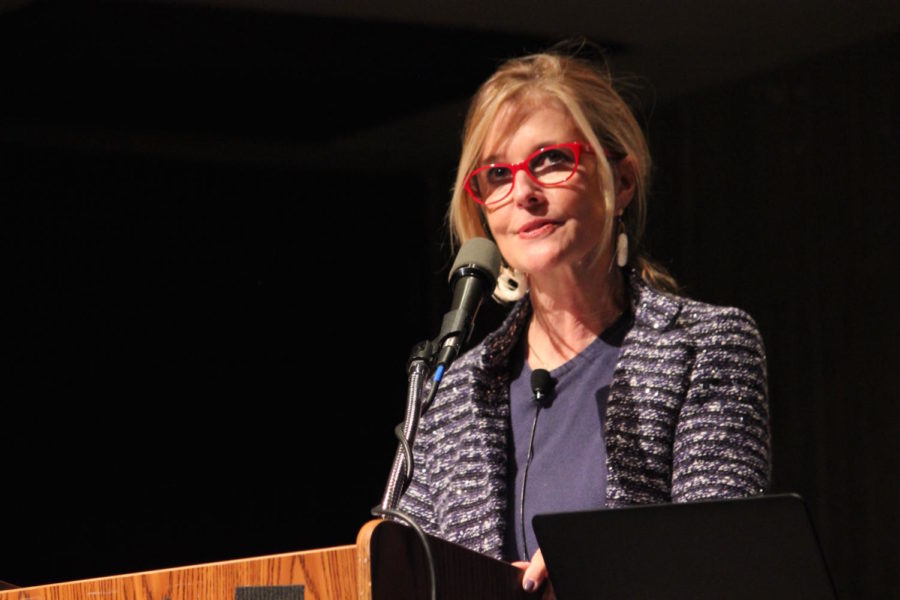Kathleen Parker talks about The Global Tide of Women Rising
Kathleen Parker, a Pulitzer Prize-winning columnist for The Washington Post presented in the Scheman Building on Nov. 12. Her experiences include working for newspapers and magazines like The Weekly Standard, TIME, Newsweek, and Fortune Small Business.
November 12, 2015
Iowa State played host to a world-renowned and award-winning journalist Thursday.
“I do think we are living in a very important time with technology, particularly in communication. Women benefit from this as much if not more than anyone,” said Kathleen Parker, a Washington Post columnist.
Moments earlier, Parker had ascended gracefully onto the stage of Benton Auditorium in the Scheman Buildling with a sparkly jacket that matched her smile.
Parker, a well-renowned journalist, author and Pulitzer Prize-winning columnist for the Washington Post, visited Iowa State to talk about an issue that is prevalent now more than ever and is reflected in the title of her lecture: “The Global Tide of Women Rising.”
With two women currently running for president, women are rising up and taking a stand. Individuals across the globe are waiting to see if the United States will elect its first female president in 2016. Parker said that this is a critical time and a stepping stone for a change in the way women are viewed in politics.
“There are two women running for president. I look forward to when that is not a headliner. Let’s face it, men have been in charge for thousands of years. If you bring women to the table, how much worse can it get?” Parker said.
Through the lecture she kept a comfortable presence on stage, sliding jokes into her talk whenever possible.
Megan Atkins, freshman in journalism, commented on Parker’s use of humor throughout the lecture.
“I like [her] humorous take on a serious matter. It made me look forward to January 2017 and gave me hope for equality between women and men,” Atkins said.
Social media and technology are tools that Parker accredited to giving women in the United States and across the globe a voice.
“No longer can a woman be shot in a public square because they have committed adultery without the rest of the world knowing,” Parker said. “This public outcry leads to change.”
According to Parker, she had not always been the feminist she is today, describing herself as a “born-again feminist.”
Growing up in the “peace, love and flowers” generation, Parker started out as an “iron-ass feminist.” She did not imagine herself getting married or having children and prided herself in her successful career. However, her views changed when she had her first child.
She began to adopt different views and started to write about the need for a husband and a wife in raising children, suggesting that men were essential and that women might need a man.
Being that they were not mothers and were still very strong feminists, many of her female co-workers in the newsroom began to shun her for her seemingly anti-feminist views.
Then, in 2007, she had a life-altering experience.
Parker traveled to Abu Dhabi in the United Arab Emirates to report on then First Lady Laura Bush’s efforts to bring the Breast Cancer Initiative to foreign countries. There she spoke with many women who were oppressed and who had no voice.
Her time in the United Arab Emirates opened her eyes to the true meaning of feminism and the need for equal rights for women all over the world.
A voice is a powerful thing, and Parker said that when you let a women use hers, change can be made. She wants to give women all around the world the ability to use their voices, saying that the public has to help women who cannot help themselves.
“It all comes back to communication. It comes back to the voice,” Parker said.

















